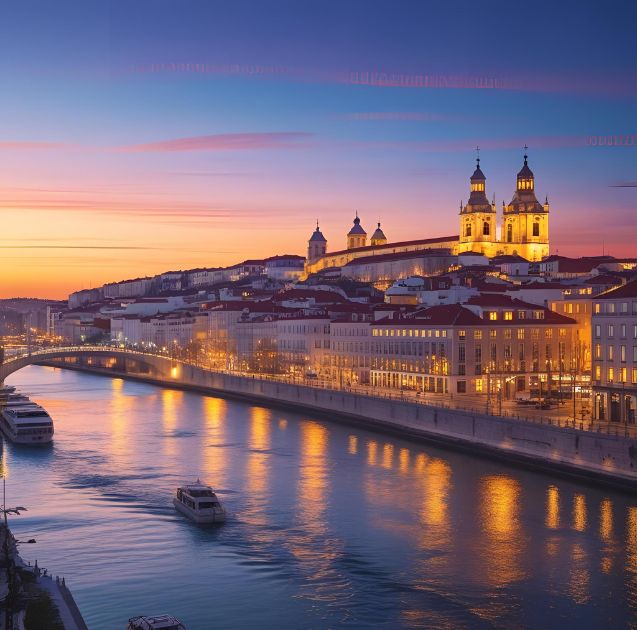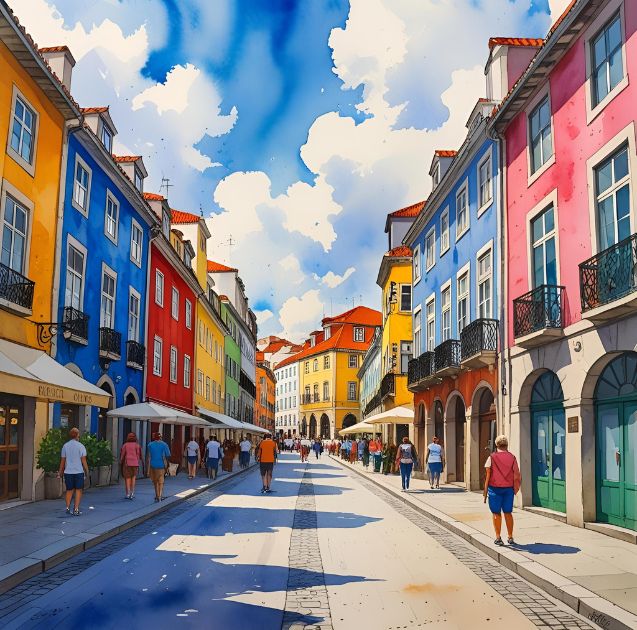
The Magnetic Pull of Lisbon for Remote Workers

Imagine this: your workday begins not with a frantic commute, but with a strong bica (Portuguese espresso) at a sun-dappled sidewalk café. Your office for the day is a vibrant co-working space buzzing with international energy, or perhaps a quiet corner of your apartment in a historic building, with the faint, melancholic sound of a distant Fado guitar drifting through the window. In the evening, you’re not stuck in traffic; you’re watching the sunset over the Tagus River, a glass of vinho verde in hand, planning a weekend surf trip to the coast. This isn’t a far-fetched dream; it’s the daily reality for thousands of digital nomads who have made Lisbon, Portugal, their home.
In recent years, Lisbon has exploded onto the scene as a premier global destination for remote professionals. It’s a city that effortlessly blends old-world charm with a forward-thinking, creative spirit. From its tile-adorned facades and rattling yellow trams to its booming tech scene and welcoming international community, Lisbon offers a unique combination of affordability, culture, and quality of life that is hard to resist. But moving to a new country, even temporarily, involves more than just booking a flight. It requires planning, paperwork, and insider knowledge.
This ultimate guide is designed to be your comprehensive roadmap. We’ll cut through the noise and provide you with the practical, actionable information you need to successfully launch your digital nomad life in Lisbon. We’ll cover the crucial visa situation, break down the best neighborhoods to live in, guide you to the top co-working spaces, and offer tips on how to truly live like a local. Get ready to turn your Lisbon dream into a well-executed plan.
Section 1: Why Lisbon? The Allure for Digital Nomads
What is it about this coastal European capital that has everyone talking? It’s a multifaceted appeal that caters perfectly to the modern remote worker’s checklist.
A Thriving Tech and Creative Hub
Lisbon is no longer just a historic gem; it’s a burgeoning tech powerhouse. The city hosts the annual Web Summit, the largest tech conference in the world, which has cemented its reputation as a place for innovation and networking. This has fostered a dynamic ecosystem of startups, freelancers, and established tech companies, creating a palpable energy and endless opportunities for collaboration.
Vibrant International Community
You’ll never feel alone in Lisbon. The city is a melting pot of cultures, with a large and welcoming community of expats and digital nomads from every corner of the globe. This makes it incredibly easy to build a social circle, find networking events, and share experiences with like-minded individuals. Numerous Facebook groups, Slack channels, and Meetup events are dedicated to connecting newcomers.
Unbeatable Quality of Life
Lisbon offers a balanced lifestyle that prioritizes well-being. The pace is more relaxed than in other major European capitals. The weather is a huge draw, with over 290 days of sunshine a year, encouraging an outdoor lifestyle. The proximity to stunning beaches like those in Cascais and Costa da Caparica means you can easily swap your laptop for a surfboard after a productive work week.
Relative Affordability
While prices have been rising due to its popularity, Lisbon remains one of the more affordable capital cities in Western Europe. The cost of dining out, public transportation, and daily essentials is significantly lower than in places like London, Paris, or Amsterdam. This allows your income to stretch further, affording you a higher quality of life without breaking the bank.
Section 2: Navigating the Paperwork: Visas for Digital Nomads
This is often the most daunting part of the process, but Portugal has made significant strides to attract remote talent. As of 2025, there are two primary routes for non-EU digital nomads planning to stay longer than 90 days. Disclaimer: Visa regulations are subject to change. Always consult the official website of the Portuguese Consulate or Embassy in your home country for the most up-to-date information and requirements.
The Portugal Digital Nomad Visa (D8 Visa)
Launched in late 2022, this visa is specifically designed for remote workers. It allows you to legally reside in Portugal while working for a company or clients based outside of the country.
- Key Requirement: The most critical requirement is proof of income. You must demonstrate a monthly income equivalent to at least four times the Portuguese minimum wage. As of early 2025, this is approximately €3,280 per month.
- Documentation: You’ll typically need a valid passport, proof of income (employment contracts, freelance agreements, bank statements), proof of accommodation in Portugal for your initial stay, a clean criminal record check, and travel insurance.
- The Process: You apply for the visa at the Portuguese consulate in your country of residence. If approved, you receive a temporary visa (usually valid for four months) that allows you to enter Portugal. Once in Portugal, you must schedule an appointment with AIMA (the Agency for Integration, Migration, and Asylum) to receive your two-year residence permit.
The D7 Visa (Passive Income Visa)
Before the D8 existed, the D7 was the go-to visa for many remote workers. While still an option, its focus has shifted more towards individuals with legitimate passive income (pensions, dividends, rental income, royalties). If your income is derived from active remote work, the D8 is the more appropriate and direct route. The D7’s income requirement is lower (equivalent to the Portuguese minimum wage, around €820/month as of early 2024), but you must prove the income is passive.
Getting Your NIF (Número de Identificação Fiscal)
Regardless of your visa, one of the first things you’ll need in Portugal is a NIF, or tax identification number. You need it for almost everything: opening a bank account, signing a lease, getting a phone plan, and filing taxes. You can obtain a NIF by visiting a Finanças (tax office) in person or, more easily, by using one of the many online services that will procure it for you for a fee, often with a fiscal representative included.
Section 3: Setting Up Your Workspace: Top Co-working & Cafés
Lisbon’s co-working scene is as diverse and creative as the city itself. Whether you crave a quiet, design-led space or a bustling community hub, you’ll find your perfect spot.
Premier Co-working Spaces
- Second Home Lisboa: Located in the Time Out Market building, this is arguably Lisbon’s most famous co-working space. It’s a stunning urban jungle filled with over 1,000 plants and a mid-century modern aesthetic. It’s on the pricier side but offers an inspiring environment, great community events, and wellness classes.
- LACS (Lisbon Art Center & Studios): With a prime location on the Rocha Conde de Óbidos dock, LACS boasts incredible river views. It’s a massive space that attracts a mix of creative agencies, startups, and freelancers. The rooftop bar is a major perk for after-work networking.
- Heden: With multiple locations across the city (including Graça and Chiado), Heden focuses on sustainability, community, and art. The spaces are beautifully designed with a minimalist, Scandinavian feel and a strong focus on natural light. They host regular art exhibitions and workshops.
- Outsite / Selina: These brands represent the co-living and co-working hybrid model. They are perfect for nomads who want a seamless, all-in-one solution for accommodation and workspace. They offer excellent community vibes and are a great way to meet people right after you arrive.
Work-Friendly Cafés
For days when you prefer a more casual setting, Lisbon’s specialty coffee scene has you covered.
- Copenhagen Coffee Lab: A reliable favorite with several locations, offering great coffee, minimalist design, and plenty of power outlets. A solid choice for a few hours of focused work.
- Fábrica Coffee Roasters: Serious about their coffee, this local chain has a few spacious locations that are generally welcoming to laptop users, especially during non-peak hours.
- Hello, Kristof: A small, cozy, and very aesthetically pleasing spot that combines coffee with independent magazines. It can get busy, so it’s best for short work sprints.
Section 4: Finding Your Home: A Guide to Lisbon’s Neighborhoods
Choosing the right bairro (neighborhood) is key to your Lisbon experience. Here’s a breakdown of the most popular areas for digital nomads.
- Alfama & Graça: The historic heart of Lisbon. Think narrow, winding cobblestone streets, historic Fado houses, and breathtaking viewpoints (miradouros). Vibe: Authentic, charming, and very picturesque. It can be hilly and tourist-heavy in parts.
- Baixa & Chiado: The downtown core. Baixa is the grand, grid-like commercial center, while Chiado is the elegant, sophisticated hub for shopping, theaters, and historic cafés. Vibe: Central, convenient, and always bustling. Rent is highest here.
- Príncipe Real: North of Chiado, this is Lisbon’s trendiest neighborhood. It’s known for its beautiful 19th-century buildings, high-end boutiques, concept stores, and fantastic restaurants. Vibe: Posh, fashionable, and sophisticated.
- Santos & Lapa: Santos, the “design district,” is full of art galleries and studios, popular with a younger, creative crowd. Lapa is an adjacent, quieter, and more affluent residential area home to many embassies. Vibe: Creative and cool (Santos) to quiet and elegant (Lapa).
- Anjos & Intendente: Once gritty, these neighborhoods along the green metro line have transformed into the city’s most diverse, multicultural, and up-and-coming areas. Vibe: Hip, alternative, and more affordable, with a vibrant arts scene.
Tips for Finding Accommodation
The rental market in Lisbon is competitive. Start your search on platforms like Idealista, Flatio (which specializes in furnished, mid-term rentals for nomads), and long-stay options on Airbnb. Be prepared to act fast when you find a place you like. Having your NIF and a Portuguese bank account ready will make you a more attractive tenant.
Section 5: The Cost of Living: Budgeting for Your Lisbon Life
Here is a realistic breakdown of potential monthly expenses to help you budget. (Note: These are estimates and can vary widely based on lifestyle.)
- Accommodation (T1/Studio Apartment): €850 – €1,400+
- Utilities (Electric, Water, Gas, Internet): €100 – €150
- Co-working Space (Hot Desk): €150 – €250
- Groceries: €250 – €350
- Transportation (Viva Viagem Monthly Pass): €30 – €40
- Dining Out & Entertainment: €300 – €500+
- Total Estimated Monthly Cost: €1,680 – €2,700+
Section 6: Living Like a Local: Beyond the Tourist Trail
To truly make the most of your time, integrate into the local culture.
- Learn Basic Portuguese: While many people in Lisbon speak English, making an effort with the local language goes a long way. Learn key phrases like Bom dia (Good morning), Por favor (Please), and Obrigado/Obrigada (Thank you). Locals will appreciate the gesture.
- Master Public Transport: Get a Viva Viagem card. It’s a rechargeable card that works on the metro, buses, trams, and even ferries. It’s the most efficient and affordable way to get around.
- Embrace the Prato do Dia: Look for restaurants offering a prato do dia (dish of the day) at lunchtime. It’s a set menu that usually includes a main course, a drink, and sometimes a coffee for a very reasonable price (€8-€12). It’s the best way to eat well and affordably.
- Explore Beyond the City Center: Use your weekends for day trips. Take the train to the fairy-tale palaces of Sintra, the charming seaside town of Cascais, or take a ferry across the river to Costa da Caparica for its long stretches of sandy, surf-friendly beaches.
Conclusion: Your Lisbon Adventure Awaits

Lisbon is more than just a beautiful and trendy destination; it’s a city that offers a genuine opportunity for a richer, more balanced life. It provides the infrastructure for professional success with its robust connectivity and co-working culture, while simultaneously feeding the soul with its art, history, and natural beauty. The path to becoming a Lisbon digital nomad requires preparation, from securing the right visa to navigating the rental market. But for those willing to take the leap, the reward is a life less ordinary in one of Europe’s most captivating capitals. The sun, the sea, and a vibrant community are waiting for you.










Leave a Reply